Growing Potatoes
It was Potato Day in my neighbouring village of Dunblane at the weekend so we popped up with M&D to have a look. It was a busy old gathering of people and we bumped into friends, colleagues and clients while we were there! So, what happens at Potato Day and what has it got to do with growing potatoes, I hear you say?…
Potato Day
Well, Potato Day is a gathering of people who are selling a huge range of different varieties of potatoes. From your early potatoes to salad potatoes there was a variety to suit your garden. You could buy a bulk bag of your favourite variety or just individual tubers of ones you haven’t tried before to suit your allotment size. There was also a stall selling lots of seeds and onion sets so you could get your whole GYO area sorted out for the season ahead.

Potato Day in Dunblane
Our Picks
We opted to go for 3 different varieties of potatoes this year. We normally only choose one as we don’t have lots of space so it was a real treat to be able to choose individual tubers and get the exact quantities we wanted. You can also look at each tuber and make sure none are soft, mouldy or shrivelled. We chose:
1st Early – Arran Pilot. A very early traditional potato, the most popular potato grown in the UK in the 1930s! A new one to us.
2nd Early – Maris Peer. A great tasting early potato. We grow this potato lots and we love it!
Salad potato – International Kidney. This one makes a very tasty salad potato with a waxy texture. Another new one for us to try.
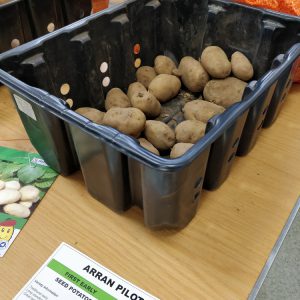
A great choice of potatoes
What next…
You need to “chit” your potatoes before you can plant them in the ground. Chitting means sprouting the tuber – putting it, most eyes upright, in a light, cool but frost-free place at about 10C. Old egg cartons are a great holder for your potatoes while they are chitting. Chitting potatoes gives you a quicker and slightly larger harvest.
Once you have healthy, short, green shoots, about an inch long, they are ready to be planted in the ground. Rub off all but 3 or 4 of the healthiest shoots at the top of your potatoes.
Dig straight, shallow trenches, two to three feet apart, in prepared soil. Plant seed potatoes 12 inches apart and cover with about 3 inches of soil. When the shoots reach 10 to 12 inches tall, use a hoe or shovel to scoop soil from between rows and mound it against the plants, burying the stems halfway.
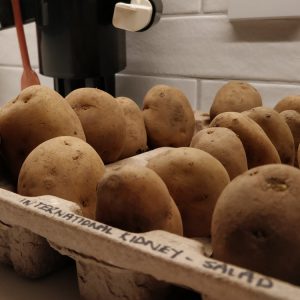
Potato chitting
Your first early potatoes should be ready to dig up around June/July with the second earlies about a month later. If you choose maincrops they will be ready from August through to October.
Happy potato growing!
Lulu & Tilda xx
How To Grow Potatoes
My latest blog tells you all you need to know to grow the perfect potatoes in an easy to follow guide. It’s gotta be simple, I’m only 5 right!
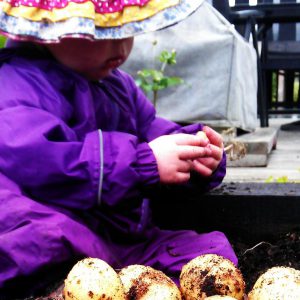
Lulu growing potatoes
How to grow potatoes…
- Buy some seed potatoes
- Chit your potatoes on a window sill as soon as you buy them. Chitting just means letting the wee “eyes” grow a bit longer which gives them a head start for when you pop them in the ground.
- Plant them in the ground about 20cm deep and about 30cm apart.
- “Earth up” your potatoes as soon as shoots start to appear, raking up the soil around them and covering them back up, protecting them from the sunlight. You will need to do this 2-3 times in the growing season.
- Feed your potatoes every week, they will grow big and strong, just like me.
- Early varieties will be ready in 8 weeks, main crops in the summer. Gently move soil aside to pick your potatoes, you don’t need to pick them all at once and they taste best freshly picked.
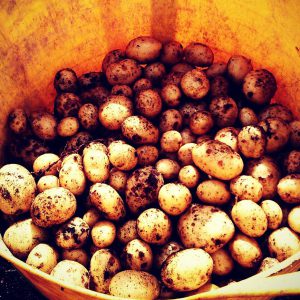
Our potato crop
Top tips:
- You can grow potatoes anywhere. Veg beds, compost bags, specialist potato bags, old tyres, tall pots, whatever you have to hand.
- Potatoes need drainage so if you have clay soil then dig in some gravel. You are planting in pots, raise the pots and make sure they have drainage holes.
- Potatoes like sunshine (like me!) so don’t grow them in a shady corner.
- Always water the base of the plant not the foliage.
- Remove flowers when they appear to put more energy into the tuber the plant is creating.
- Dig up your potatoes on a dry day and leave them to dry in the sun for an hour.
Lulu x
Perfect Potatoes
Potatoes are great, aren’t they? They are a bit like me, wonderfully versatile 😉 As you all know by now, I am Lulu the Secret Blogger, and I like to update you on what is happening in my garden as well as lots of other general gardening wonderments. Today, I am mostly talking perfect potatoes (or top tatties!)
M&D have tried many varieties of potatoes over the years, some good, some not so good. They reliably informed me that one of their favourites was Maris Peer so that was what we chose to plant again this year. Way back in April, when it felt like summer would never arrive, we planted our seed potatoes in our raised beds. Over the months I watched with amazement as plants would poke through the surface of the soil which would then be covered over again with earth until they sprouted so high they were free to sun themselves. Flowers appeared and then, eventually, the foliage slowly started to die back. One day, Daddy announced it was time to dig deep in the raised beds and see what we could find – how exciting! Just like a treasure hunt. Here are some photos of how to successfully dig up potatoes, Lulu-style…
- First, dig and collect the potatoes. Be careful with your fork as you don’t want to spear all the potatoes and ruin them.
- Next, carefully inspect each potato. Teeny small ones, green ones & rotten ones are all discarded.
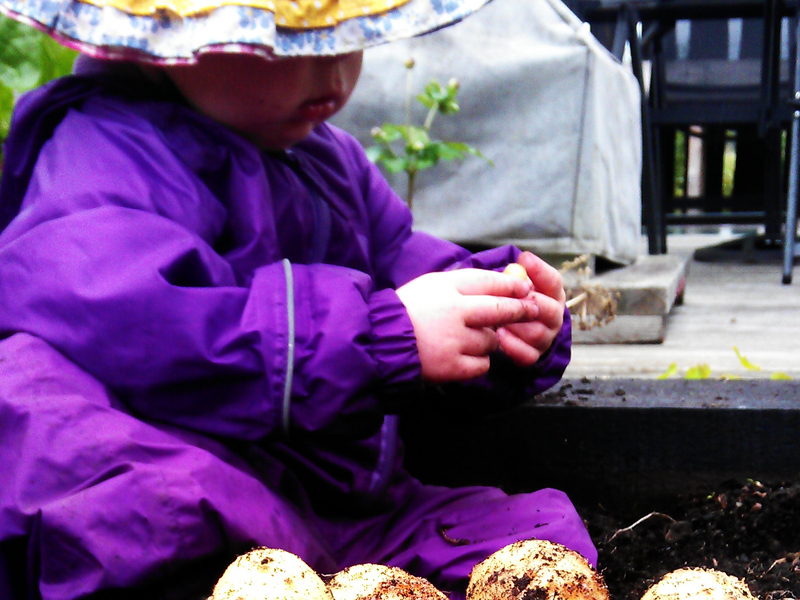
Quality control is very important when you are sorting perfect potatoes
- Then, carefully put the potato in the correct trug. One for good potatoes, one for the discarded potatoes. It’s important to remember which one is which!
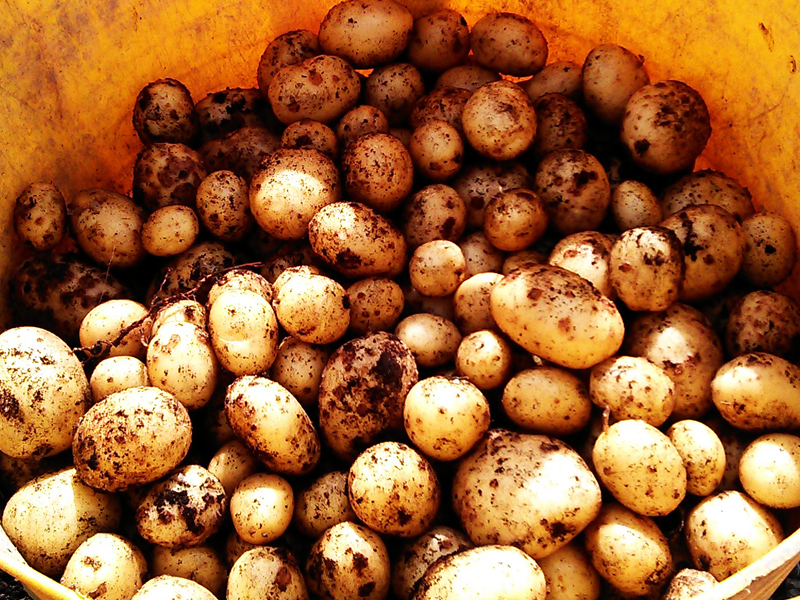
Our trug full of lovely perfect potatoes
- It is very hard work so if you feel tired, have a wee lie down! They did say this was a raised bed!
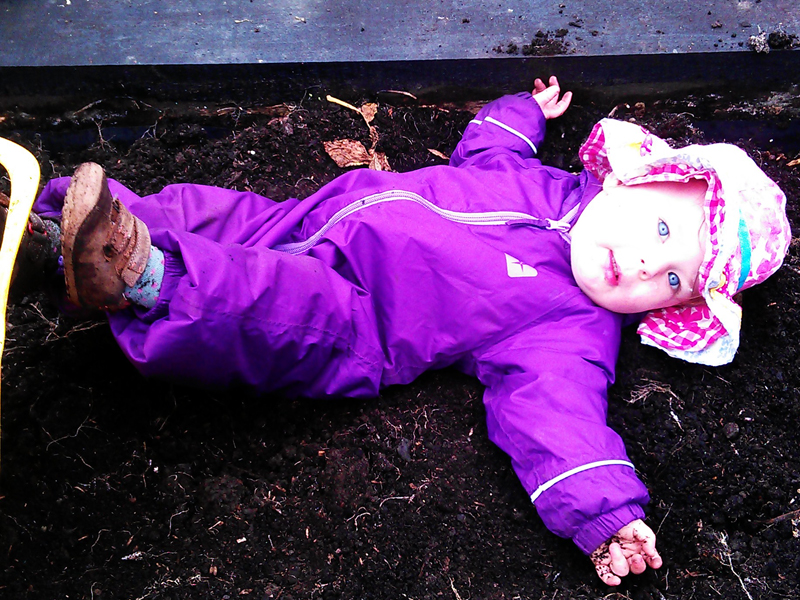
Have a lie down in the veg beds – it is such hard work!
5. Serve them with some of the other lovely veg from your garden, yum!
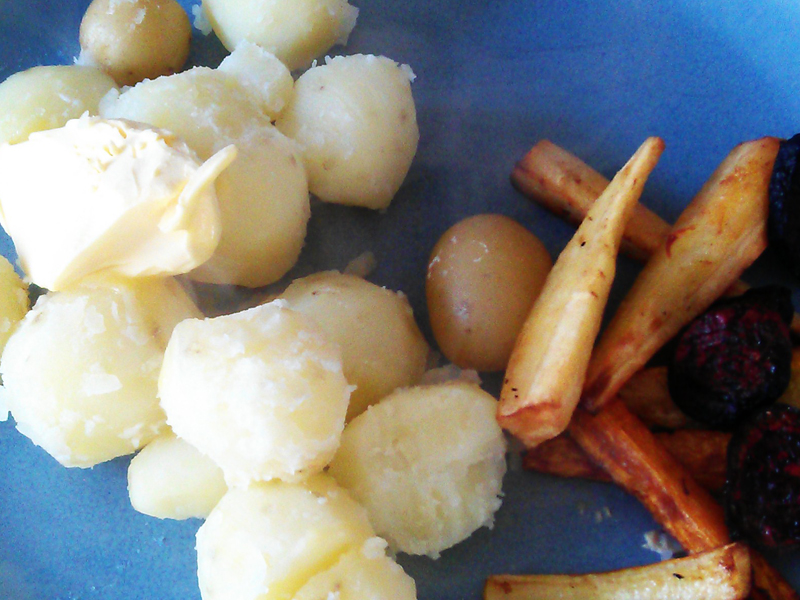
A plate full of lovely home grown veg
We grew our potatoes in our raised beds but you can grow potatoes anywhere – in your flower border, in a pot, in a compost bag. They are super-easy to grow, really cheap and they taste so much nicer than supermarket potatoes.
Store your potatoes in a hessian sack in a cool, dry place like your shed or garage. They will keep well for a few months but keep checking on them and remove any that are starting to show signs of rot straight away.
Hope you have as much fun as I did digging (and eating) up potatoes! Click here to read about what else we have harvested this year.
Lulu